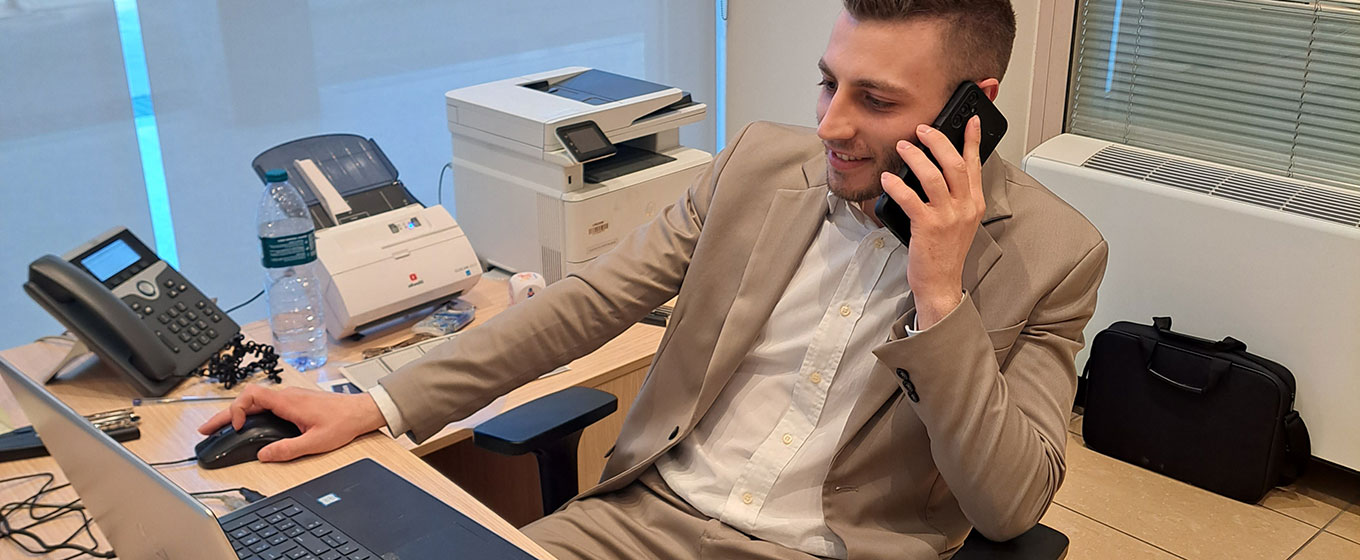From Languages to AI: How a Humanities Graduate Built a Career in Artificial Intelligence

by Mateo Medina Abad
Can you work in AI without a tech background? Alessandro Giaconia, a graduate of Università Cattolica, proves it’s possible. After studying languages, he leapt into Linguistic Computing and ended up designing a fraud detection algorithm that is now used at a major Italian bank.
Picture someone who trusts the unknown – who steps forward when the moment feels right. It might sound romantic, but sometimes, the best paths aren’t carefully planned; they’re found in the courage to take a leap.
A jump has risks – you either land your dream job or crash and start over. But sometimes, trusting your feelings leads to something unexpected – like presenting your financial crime detection algorithm at CLiC-it, Italy’s top Computational Linguistics conference.
Well, that is the story of Alessandro Giaconia, although it may sound hard to believe, considering that just three years ago, he disliked math (he still does) and had never written a line of code.
Passionate about history and linguistics, Alessandro completed his Bachelor’s in Languages for Management and Tourism. It made sense. It fit. And yet, it felt like something was missing. He couldn’t see a future that truly excited him.
Then, one afternoon, without planning, he wandered into an Open Day at Università Cattolica del Sacro Cuore. As he walked past a stand and listened to Professor Passarotti talk about Computational Linguistics, something felt right.
That night, Alessandro found himself on Reddit. Curious about what he heard, he asked questions about everything he could think of. There, a small hint of his future appeared in front of him. “Today, everything is related to computer linguistics, from the dictionary in WhatsApp to ChatGPT,” he says.
Could this be his way forward? He had avoided calculus from high school, so it wasn’t easy. But he jumped at the chance and enrolled. It was the first-ever edition of the Linguistic Computing MSc programme at Cattolica.
While Linguistic Computing still relates closely to what he studied before, especially languages, it involves a lot of math. A lot. But even the number-heavy classes were kind of fun. That was a turning point. “Okay, maybe the exams didn’t go perfectly,” he laughs, "but I genuinely enjoyed learning something new.”
But more importantly, for the first time, he felt what he was learning was not just interesting but useful. “When people ask how ChatGPT works and you can explain it, you’re the coolest person in the room,” he jokes. In his words, Linguistic Computing bridges human language and machines. “I think that helping people and making their life easier is one of the most beautiful things you can do,” he says proudly while reflecting on his studies.
That mindset turned into action during his internship at Credem, one of the major Italian banks. His job swiftly became a deep dive into fraud detection, applying his linguistic and analytical skills in ways he hadn’t expected. “It turned out to be fascinating,” he admits.
“I was looking at patterns, language, inconsistencies... and I realised it was all connected to what I had been studying. And it was really cool.” A word he repeats often – one that, in many ways, defines his story.
While still an intern, he developed an algorithm for his thesis that helped Credem's auditing process identify transactions linked to money laundering and terrorism. Like every code, it didn’t run at first. It turned out he had downloaded the Lithuanian model instead of the Italian one. But even with a “toaster,” it worked!
Once intimidated by math, Alessandro now writes code used in one of Italy’s largest banks – proof that a bold leap can turn everything around.
When his internship ended, he had left a mark. The bank offered him a full-time position.
By the time he returned to CLiC-it, the nervousness he had felt at the beginning was long gone. His work was not just recognised – it was celebrated. “It was a moment like, oh, maybe I'm that good!” he laughs.
What started as a venture into the unknown had led to something stable, something meaningful. Opportunities knocked. Alessandro answered.


 Read the article "FAQ: Transitioning from Humanities to AI – What You Need to Know"
Read the article "FAQ: Transitioning from Humanities to AI – What You Need to Know"